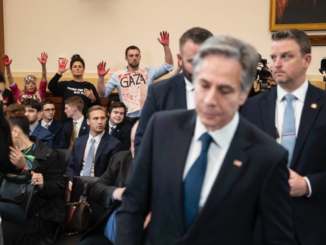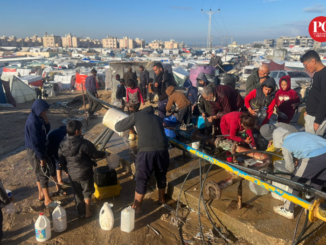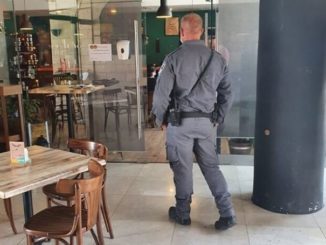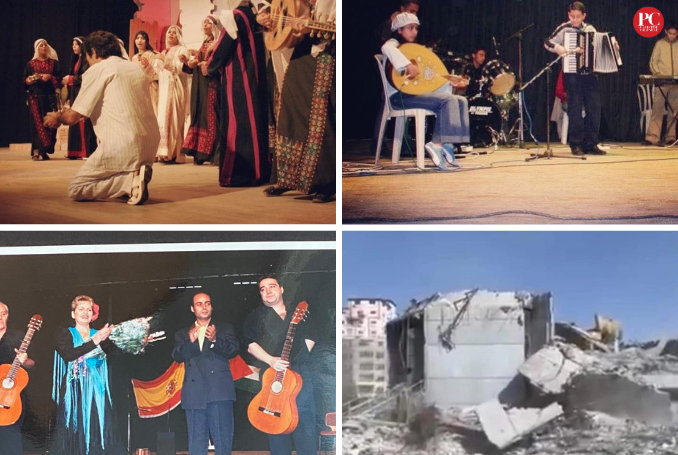
On Saturday, November 25, as Palestinians scanned the debris in the wake of the temporary ceasefire agreement, it was revealed that the Zionist bombing campaign had totally destroyed one of Gaza’s most important cultural centers.
The Rashad al-Shawwa Theater had been a beacon of cultural vibrancy for over two decades, a place of performance, poetry, music, art and local engagement.
Its stage had seen the likes of Mohammed Assad, Reem Talhami, and the greats of Palestinian music and theater.
The bombing has been widely condemned among Palestinians whose memories of the Rashad al-Shawwa run deeply.
Aser al-Saqqa, Cultural Activist
Today, I wanted to share my deep ANGER and personal devastation about my beloved cultural center, the Rashed Al-Shawa Cultural Centre.
This was a two-story, triangular concrete building nestled in the Al-Rimal neighborhood and stood as a testament to Palestinian resilience and love of culture, including the lost tens of thousands of books in the Tamari Sabbagh Library!
It was also the venue of the first event I ever curated in 1994 – a performance by Sabreen, Jerusalem.
South African President Nelson Mandela, but even Jacques Chirac and Bill Clinton spoke there… I went on to program Spanish flamenco, Clowns Without Borders, film screenings, puppet shows, performances, visual arts exhibitions, and more. The photo of me on the magnificent entrance steps shows a folk dance group from Zaragoza, Spain.
The Rashed Al-Shawa Cultural Center served as both an architectural marvel and a symbol of national identity! The construction took place 1985 – 1988 and it was formally opened in 1992. It became the most significant purpose-built cultural landmark in Palestine, a beacon of hope against the backdrop of Israeli occupation.
Millions of dollars were invested in this iconic building, a combined effort of charitable and philanthropic donations.
But this was not just a building, the center was a hub and welcoming space for all groups of people to rehearse, perform, and exhibit.
The people who worked there were wonderfully supportive of whoever used the space. The print center in the basement served as an income generator.
The center was designed by Syrian architect Sa’ad Mohaffel and was located between Gaza’s old city and the beach.
Named after the former mayor Rashad Said Al Shawa (1971-1982) The build from conception to completion was fraught with challenges. It faced numerous roadblocks erected by Israel, determined to thwart its construction. In my conversations with the late Leila Shawa, she was always so proud of this building and the achievement it represented. She designed the glass panels in the large foyer and library.
As the people of Gaza began to explore the extent of the destruction of their city yesterday, it became clear that this immense building had also been destroyed as a result of the relentless Israeli attacks on my city and the whole of the Gaza Strip.
Nevertheless, the achievements of the Rashed Al-Shawa Cultural Centre stand unyielding, a symbol of hope and resilience in the face of adversity. It will continue to inspire and empower young Palestinians.
Israel sets up two distinct standards tailored upon their added value to their Zionist narrative over Palestinian lands. On one hand, cultural heritage sites that serve this narrative and are directly controllable by the Israeli Occupying Forces are appropriated and exploited to reinforce this narrative. On the other hand, cultural heritage sites that conflict with this narrative are targeted, damaged and destroyed, in an attempt to erase them from the memory of people.
Gaza’s historical landmarks and cultural assets belong to all people and human history, not just to the nation in which they are situated.
We ask for an urgent need for an impartial international investigation into Israel’s violations and crimes, in order to pressure Israel to stop its genocide of Palestinians and to ultimately hold it accountable for its abhorrent violence and legal and financial compensation process is needed indeed.
When will Israelis learn that our identity and culture will continue to resist them, no matter what?
Reem Anbar, Oud Player and Musician
Rashad al-Shawwa is the largest and most important theater and cultural center in the Gaza Strip and has now found to have been completely destroyed by the Zionist bombings. It was the most important venue for all of the stars of Arab and Palestinian art in Gaza.
I have played on this stage since my childhood and always loved keeping photos of my concerts in this theater specifically, because with every concert I had a dream. I saw my dream growing as I grew older and played on that stage many times. Though my photos remain in our house in Gaza city, which has been destroyed by the tanks, the memories remain.
Israel has destroyed many cultural centers and theaters in Gaza over the course of more than one war. Israel’s goal is to destroy and obliterate Palestinian artistic culture and kill the creativity of the Gazan youth.
But here we are, the youth of Gaza, spreading throughout the world to perform Palestinian culture and art everywhere. We will not lose Gaza despite the will of the Israelis.
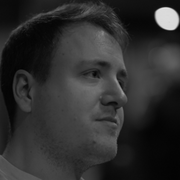
– Louis Brehony is a musician, activist, researcher and educator. He is author of the book Palestinian Music in Exile: Voices of Resistance (2023), editor of Ghassan Kanafani: Selected Political Writings (2024), and director of the award-winning film Kofia: A Revolution Through Music (2021). He writes regularly on Palestine and political culture and performs internationally as a buzuq player and guitarist. He contributed this article to The Palestine Chronicle.

